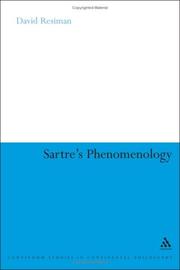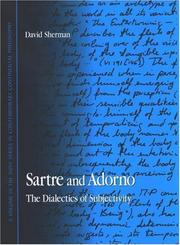| Listing 1 - 4 of 4 |
Sort by
|

ISBN: 2864321297 9782864321293 Year: 2007 Volume: 2 Publisher: Lagrasse: Verdier,
Abstract | Keywords | Export | Availability | Bookmark
 Loading...
Loading...Choose an application
- Reference Manager
- EndNote
- RefWorks (Direct export to RefWorks)
Peu de temps avant sa mort, Sartre faisait paraître dans Le Nouvel Observateur une série d'entretiens avec Benny Lévy («L'espoir maintenant») qui scandalisèrent tant par leur contenu que par leur ton.Dix ans plus tard, le moment vint de les donner vraiment à lire. Benny Lévy en proposa alors un nouvel usage.Dans ce texte «ascétique», grâce à un exceptionnel mouvement de dépouillement, Sartre tente de repenser le commencement : ne faudrait-il pas déceler dès l'origine, dans le projet propre à la conscience, une tension...
Sartre, Jean Paul --- -Interviews --- Sartre, Jean-Paul, --- Sartre, Jean-Paul --- Interviews --- Sartŭr, Zhan-Pol --- Sartr, Zhan-Polʹ --- Sārtar, Jān-Būl --- Sārtar, Zhān-Pūl --- Sha-tʻe --- Sartre, J.-P. --- Sa-tʻe --- Sate --- Sa-tʻe, Jang-Pao-erh --- Sate, Rangbao'er --- Sāt, Chō̜ng-Pō̜n --- Sarutoru --- Sarṭr, G'on Pol --- Chō̜ng-Pō̜n Sāt --- Cārttar, L̲ān̲-Pōl --- Сартp, Жан-Поль, --- סארטר, ג׳אן פול --- סארטר, ג׳אן פון --- סארטר, ז׳אן פול --- סארטר, ז׳אן־פול, --- سارتر، جان پول --- Guillemin, Jacques --- Sārtra, Jyām̐ Pāla --- サルトル, ジャン ポール

ISBN: 9780826487254 0826487254 Year: 2007 Volume: *3 Publisher: London ; New York Continuum
Abstract | Keywords | Export | Availability | Bookmark
 Loading...
Loading...Choose an application
- Reference Manager
- EndNote
- RefWorks (Direct export to RefWorks)
. In Being and Nothingness Sartre picks up diverging threads in the phenomenological tradition, weaves them together with ideas from Gestalt and behaviourist psychology, and asks: What is consciousness? What is its relationship to the body, to the external world, and to other minds? Sartre believes that the mind and its states are by-products of introspection, created in the act that purports to discover them. How does this happen? And how are we able to perceive ourselves as persons - physical objects with mental states? Sartre's Phenomenology reconstructs Sartre's answers to these crucial q
Existentialism. --- Existential psychology. --- Psychology, Existential --- Existentialism --- Phenomenological psychology --- Phenomenology --- Psychoanalysis --- Existenzphilosophie --- Ontology --- Philosophy, Modern --- Epiphanism --- Relationism --- Self --- Sartre, Jean-Paul, --- Strawson, P. F. --- Strawson, Peter Frederick --- Sartŭr, Zhan-Pol, --- Sartr, Zhan-Polʹ, --- Sārtar, Jān-Būl, --- Sārtar, Zhān-Pūl, --- Sha-tʻe, --- Sartre, J.-P. --- Sa-tʻe, --- Sate, --- Sa-tʻe, Jang-Pao-erh, --- Sate, Rangbao'er, --- Sāt, Chō̜ng-Pō̜n, --- Sarutoru, --- Sarṭr, G'on Pol, --- Chō̜ng-Pō̜n Sāt, --- Cārttar, L̲ān̲-Pōl, --- Сартp, Жан-Поль, --- סארטר, ג׳אן פול --- סארטר, ג׳אן פון --- סארטר, ז׳אן פול --- סארטר, ז׳אן־פול, --- سارتر، جان پول --- Guillemin, Jacques, --- Sārtra, Jyām̐ Pāla, --- Sartre, Jean-Paul, 1905-1980. --- Existential psychology --- Philosophy & Religion --- Philosophy --- Sartre, Jean-Paul --- Sartŭr, Zhan-Pol --- Sartr, Zhan-Polʹ --- Sārtar, Jān-Būl --- Sārtar, Zhān-Pūl --- Sha-tʻe --- Sa-tʻe --- Sate --- Sa-tʻe, Jang-Pao-erh --- Sate, Rangbao'er --- Sāt, Chō̜ng-Pō̜n --- Sarutoru --- Sarṭr, G'on Pol --- Chō̜ng-Pō̜n Sāt --- Cārttar, L̲ān̲-Pōl --- Guillemin, Jacques --- Sārtra, Jyām̐ Pāla --- サルトル, ジャン ポール --- Phénoménologie --- Sartre, jean-paul
Book
ISBN: 9782296028395 229602839X Year: 2007 Publisher: Paris: L'Harmattan,
Abstract | Keywords | Export | Availability | Bookmark
 Loading...
Loading...Choose an application
- Reference Manager
- EndNote
- RefWorks (Direct export to RefWorks)
Bien que L'Être et le Néant annonçât, déjà en 1943, l'esquisse d'une morale répondant aux critères d'une ontologie de la liberté et d'une psychanalyse existentielle. il a fallu attendre l'année 1983 pour que soient enfin publiés, à titre posthume. trois ans après la mort de Sartre, les Cahiers pour une Morale rédigés en 1947-1948. L'objet du présent ouvrage est non seulement l'analyse synthétique de l'approche sartrienne consistant à esquisser les fondements théoriques d'une nouvelle morale. conformes aux exigences philosophiques de l'existentialisme, mais aussi la reconstruction théorique de la morale sartrienne en sa totalité, en menant en évidence son évolution constante d'une approche ontologico-phénoménologique vers une morale existentialo-marxiste qui marque notamment les Conférences de Sartre à Rome (1964) ainsi que les textes que le philosophe avait préparés pour son cycle de conférences prévu à l'université Cornell (Etats-Unis. 1965). L'ouvrage aborde également, dans cette même perspective, le problème d'une " troisième morale " sartrienne émergeant dans les entretiens de Sartre avec Benny Lévy (1979-1980).
Sartre, Jean-Paul, --- Existential ethics --- Ethics, Existential --- Ethics --- Existentialism --- Situation ethics --- Ethics. --- Sartre, Jean-Paul --- Sartŭr, Zhan-Pol --- Sartr, Zhan-Polʹ --- Sārtar, Jān-Būl --- Sārtar, Zhān-Pūl --- Sha-tʻe --- Sartre, J.-P. --- Sa-tʻe --- Sate --- Sa-tʻe, Jang-Pao-erh --- Sate, Rangbao'er --- Sāt, Chō̜ng-Pō̜n --- Sarutoru --- Sarṭr, G'on Pol --- Chō̜ng-Pō̜n Sāt --- Cārttar, L̲ān̲-Pōl --- Сартp, Жан-Поль, --- סארטר, ג׳אן פול --- סארטר, ג׳אן פון --- סארטר, ז׳אן פול --- סארטר, ז׳אן־פול, --- سارتر، جان پول --- Guillemin, Jacques --- Sārtra, Jyām̐ Pāla --- サルトル, ジャン ポール --- Sartre, Jean-Paul, - 1905-1980 --- Sartre, Jean-Paul (1905-1980) --- Morale

ISBN: 0791480003 143561741X 9781435617414 9780791480007 0791471152 9780791471159 Year: 2007 Publisher: Albany, NY : State University of New York Press,
Abstract | Keywords | Export | Availability | Bookmark
 Loading...
Loading...Choose an application
- Reference Manager
- EndNote
- RefWorks (Direct export to RefWorks)
Focusing on the notion of the subject in Sartre's and Adorno's philosophies, David Sherman argues that they offer complementary accounts of the subject that circumvent the excesses of its classical formation, yet are sturdy enough to support a concept of political agency, which is lacking in both poststructuralism and second-generation critical theory. Sherman uses Sartre's first-person, phenomenological standpoint and Adorno's third-person, critical theoretical standpoint, each of which implicitly incorporates and then builds toward the other, to represent the necessary poles of any emancipatory social analysis.
Phenomenology. --- Dialectic. --- Subjectivity. --- Polarity --- Polarity (Philosophy) --- Philosophy, Modern --- Subjectivism --- Knowledge, Theory of --- Relativity --- Kierkegaard, Soren, --- Adorno, Theodor W., --- Sartre, Jean-Paul, --- Kierkegaard, Søren --- Anti-climacus --- H. H. --- Adorno, Theodor W. --- Wiesengrund, Theodor, --- Wiesengrund-Adorno, Theodor, --- Adorno, Teodor V., --- Adorŭno, --- אדורנו, תאודור --- אדורנו, ת. ו. --- Adorno, Th. W. --- Sartre, Jean-Paul --- Sartŭr, Zhan-Pol --- Sartr, Zhan-Polʹ --- Sārtar, Jān-Būl --- Sārtar, Zhān-Pūl --- Sha-tʻe --- Sartre, J.-P. --- Sa-tʻe --- Sate --- Sa-tʻe, Jang-Pao-erh --- Sate, Rangbao'er --- Sāt, Chō̜ng-Pō̜n --- Sarutoru --- Sarṭr, G'on Pol --- Chō̜ng-Pō̜n Sāt --- Cārttar, L̲ān̲-Pōl --- Сартp, Жан-Поль, --- סארטר, ג׳אן פול --- סארטר, ג׳אן פון --- סארטר, ז׳אן פול --- סארטר, ז׳אן־פול, --- سارتر، جان پول --- Guillemin, Jacques --- Sārtra, Jyām̐ Pāla --- Dialectic --- Phenomenology --- Subjectivity --- Kierkegaard, Søren. --- Kierkegaard, Søren, --- サルトル, ジャン ポール --- Anti-Climacus, --- Bogbinder, Hilarius, --- Chʻi-kʻo-kuo, --- Climacus, Johannes, --- Constantius, Constantin, --- Eremita, Victor, --- Haufniensis, Vigilius, --- Johannes, Climacus, --- Johannes de Silentio, --- Kʹerkegor, Seren, --- Kierkegaard, S. --- Kierkegaard, Severino, --- Kierkegaard, Søren Aabye, --- K'i︠e︡rkegor, Sʹoren, --- Kīrkajūrd, Sūrīn, --- Kirkegaard, Soeren, --- Kirkegor, Seren, --- Ḳirḳegor, Sern, --- Kirkegors, Sērens, --- Kirukegōru, Søren, --- Kjerkegor, Seren, --- Kʻo-erh-kʻai-ko-erh, --- Notabene, Nicolaus, --- Silentio, Johannes de, --- Sūrīn Kīrkajūrd, --- Victor, Eremita, --- Vigilius, Haufniensis, --- קירקגור, סרן --- קירקגור, סורן --- קירקגור, סירן --- קירקגור, סירן, --- קירקגורד, סרן, --- 克尓凯郭尓, --- Kierkegaard, Sren,
| Listing 1 - 4 of 4 |
Sort by
|

 Search
Search Feedback
Feedback About UniCat
About UniCat  Help
Help News
News